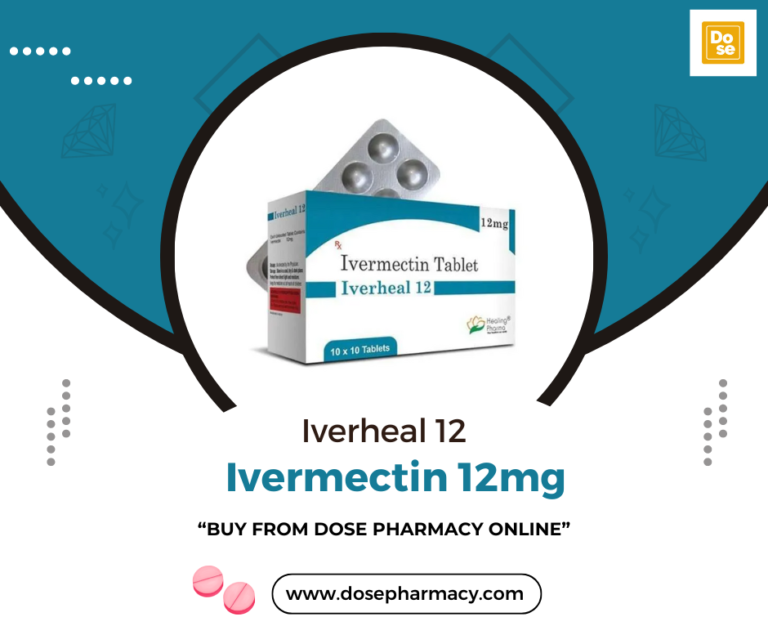Iverheal is a widely used medication containing ivermectin, a powerful anti-parasitic agent. It is effective against various infections caused by parasitic worms, mites, and certain skin conditions like scabies and rosacea. While it has proven efficacy, proper usage is critical to ensure safety and optimal results. This guide provides a detailed overview of using Iverheal tablets safely to manage infections. Ivermectin buy online on dosepharmacy.
Understanding Iverheal Tablets
What Is Iverheal?
Iverheal contains ivermectin, an anti-parasitic medication that works by paralyzing and killing parasites. It is primarily used to treat conditions like:
- Onchocerciasis (river blindness)
- Strongyloidiasis (intestinal roundworm infection)
- Scabies (a skin condition caused by mites)
- Head lice
- Other off-label uses, as prescribed by a healthcare provider.
How Does Iverheal Work?
Ivermectin targets the nervous system of parasites, causing paralysis and death. It does not affect humans similarly, as our nervous systems differ from those of parasites, ensuring safety when used correctly.
Proper Usage of Iverheal Tablets
1. Consult a Healthcare Professional
Before starting Iverheal, consult a doctor. A medical professional will:
- Determine the correct dosage based on the infection type, age, weight, and overall health.
- Assess potential interactions with other medications.
- Check for pre-existing conditions that might contraindicate use.
Self-medication is strongly discouraged because improper (ivermectin 6 mg tablet) dosing or usage can lead to adverse effects or treatment failure.
2. Dosage Guidelines
Dosage varies depending on the infection being treated. Common dosing regimens include:
- For Parasitic Infections (e.g., Strongyloidiasis):
A single dose based on body weight (usually 200 mcg/kg). - For Scabies:
One dose followed by a second dose after 7–14 days. - For Onchocerciasis:
A single dose repeated every 3–6 months.
Note: Always follow your doctor’s instructions, as they might adjust the dose for specific conditions.
3. Administration Tips
- Take Iverheal on an empty stomach, usually 1 hour before or 2 hours after meals. This improves absorption and efficacy.
- Swallow the tablet whole with a glass of water. Do not crush or chew unless instructed by your doctor.
- If you miss a dose, take it as soon as you remember. If it’s close to the next scheduled dose, skip the missed one. Never double the dose to make up for a missed tablet.
4. Duration of Treatment
- Many parasitic infections require only a single dose.
- Conditions like scabies or head lice may require multiple doses or additional treatments like topical creams.
- Adhere strictly to the prescribed duration to avoid incomplete treatment or resistance development.
Precautions and Safety Measures
1. Medical History
Inform your doctor about your medical history, including:
- Liver disease
- Kidney problems
- Immune system disorders (e.g., HIV/AIDS)
- Neurological conditions
2. Pregnancy and Breastfeeding
- Iverheal is typically not recommended during pregnancy unless necessary. Discuss potential risks and benefits with your doctor.
- Breastfeeding mothers should consult a healthcare provider, as ivermectin can pass into breast milk in small amounts.
3. Drug Interactions
Iverheal can interact with other medications, such as:
- Blood thinners (e.g., warfarin)
- Anti-seizure drugs
- Other anti-parasitic medications
Inform your doctor about all medications, supplements, or herbal remedies you are taking to avoid adverse interactions.
4. Avoid Alcohol
Alcohol consumption can exacerbate side effects such as dizziness and nausea. Avoid drinking alcohol while on Iverheal.
5. Monitor for Side Effects
While generally well-tolerated, Iverheal may cause mild to severe side effects, including:
- Common Side Effects:
- Nausea, vomiting, or diarrhea
- Dizziness or headache
- Fatigue or weakness
- Severe Side Effects:
- Rash, itching, or hives
- Swelling of the face, lips, or tongue (allergic reaction)
- Severe dizziness or breathing difficulties
- Vision changes
Seek immediate medical attention if severe reactions occur.
Special Considerations for Specific Conditions
1. Scabies
- In addition to taking Iverheal tablets, wash all clothing, bedding, and towels in hot water.
- Avoid close contact with others to prevent transmission until the infection clears.
2. Strongyloidiasis
- Follow-up stool tests may be necessary to ensure the infection is fully eradicated.
- In immunocompromised patients, a longer treatment duration might be required.
3. Onchocerciasis
- Symptoms may worsen initially due to the body’s reaction to dying parasites. This is called a Mazotti reaction and may require additional medications like antihistamines or corticosteroids.
Storage and Handling
- Store Iverheal tablets at room temperature (15–30°C) away from moisture and direct sunlight.
- Keep the medication out of reach of children and pets.
- Do not use the medication past its expiration date.
When to Seek Medical Attention
Contact your doctor if you experience:
- Persistent or worsening symptoms despite taking Iverheal.
- Severe allergic reactions.
- Symptoms of liver damage, such as yellowing of the skin or eyes (jaundice).
Conclusion
Iverheal tablets are an effective treatment for various parasitic infections when used correctly. By following medical advice, adhering to prescribed dosages, and taking necessary precautions, you can ensure safe and successful treatment. Always prioritize professional guidance over self-medication to avoid risks and maximize benefits.
Consult your healthcare provider for personalized advice if you have concerns or questions about Iverheal. Read More….
